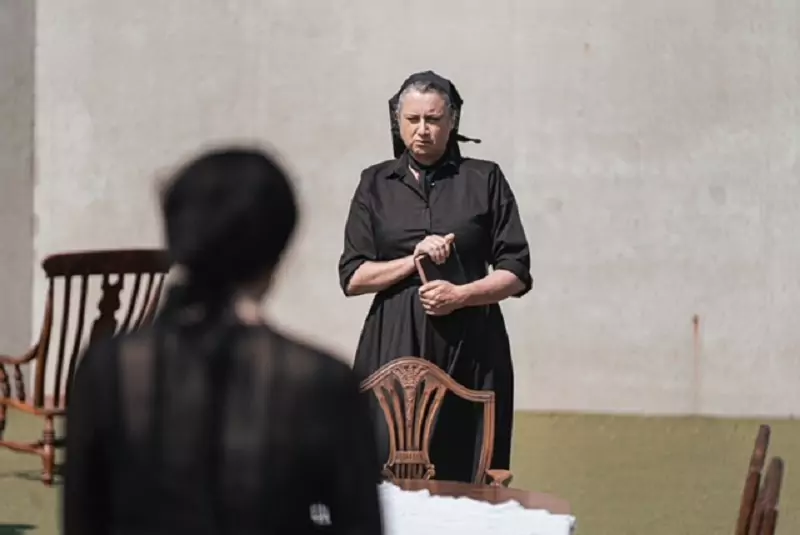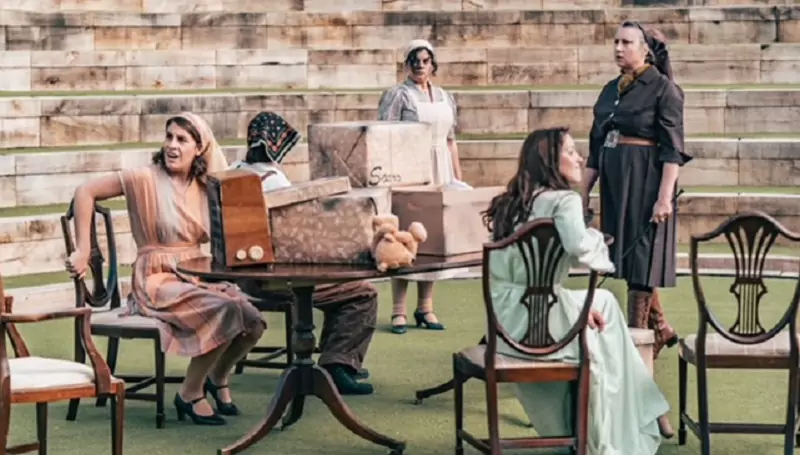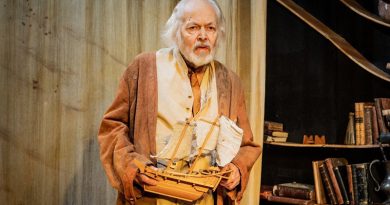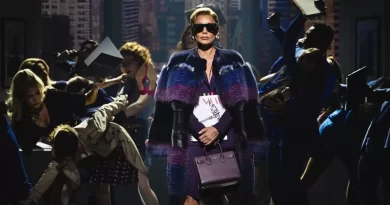“Homestead”, Brighton Open Air Theatre
Simon Jenner at Brighton Festival
21 May 2024
The UK regional premiere of Steven Dykes’s 2004 Homestead opens at Brighton Open Air Theatre (BOAT) as part of the festival, directed by Conor Baum till May 25th.

Photo credit: Sam Cartwright.
A transplanting to the 1950s American South of Lorca’s last (1936) play, the claustrophobic House of Bernarda Alba, Homestead stays close to the original. It even invokes Lorca’s poetic language with spirituals and biblical metaphor.
It’s also a microcosm of racism: a frontier family contemplate ties with Texan Hispanics, and black America isn’t far off. Nor is rock and roll. It’s 1956 and pressures from both inside and outside the homestead build.
Bernarda Alba was memorably revived at the National’s Lyttelton last December, in a version by Alice Birch. Despite being outdoors, this production feels closer to the tragedy, simpler, more immediate and uncluttered in BOAT’s horseshoe-shaped stage.
Contradictions in each character are given such space it seems that there is a sightline to every strand of longing. A lucidity as clean and deadly as Greek tragedy grips this production.
In some ways Homestead is more faithful too. More claustrophobic, though also cutting out the grandmother, so just eight characters interact without the brilliant disruptions of Lorca’s character entering dementia.
After her husband’s funeral, a rich cattle-owning matriarch virtually imprisons her five daughters under a new austere rule while preparing the oldest for marriage to a youth whose eyes stray elsewhere.
As each daughter wrestles with doubt, longing and lust, the matriarch Lillian Beckman (Deborah Kearne) enacts cruelties: stinging whips are the least of it.
Kearne is superb as a bullish autocrat “Horse and whip for a man. Needle and thread for a woman.” And yet Kearne’s Lillian commands all these qualities, enforced with the strict code of those Elders she cites.
A way of keeping Lillian’s daughters numbered in the Elect, it also occasions the a cappella singing at the start of both halves. The spirituals arranged by Temesis Conway and Martha Pavelich (also music directors), are realized in haunting descants, and remind us that some of these women feel enslaved too.
Everything in Kearne’s performance, from Lillian’s wheedling drawl, to the timing of her cruelties, is enacted at a rhythm Kearne keeps separate from her onstage daughters: only Sharon Drain dares match her deliberation, without the stance.
Matching vocal delivery with demeanour, Kearne suggests Lillian’s performative sense without it seeming exaggerated. An armour built on tradition, it’s also reacting to what Lilian deems her husband’s “indulgence”. This unfolds in revelations she refuses to acknowledge. At the climax, Kearne releases something different to the traditional Bernarda Alba that Lillian is modelled on.
Agnes (Madeleine Schofield) emerges as a taut pillar of nerves and insecurity held up by the prospect of escape and happiness in the form of marriage to the handsome offstage 21-year-old Antonio Hernandez. (All the daughters desire him.) Schofield inhabits something less than expected, not the easy authority of eldest daughter, but someone cowed by her mother and potentially supplanted by younger sisters.
As Mary Beth, Rachel Mullock (also responsible for costume design) exudes conciliation, warmth and sympathy from being her father’s favourite, or the one who loved him most. But she’s not the only one to have loved him inordinately.
Mullock’s mourning clothes giving way to subdued 1950s costumes cannily exude little of the exuberance of 1956, the year in which this play is set. Kearne’s dress remains dark, constant, buttoned but with a sheen suggestive of armour. Elsewhere, individual notes just visible on mourning dress push forward a touch more. Like the costumes, Baum’s selection of family table and chairs – with two homely straight-backs – are distilled to essence.
Ava Gypsy’s Maria Lee shares with the youngest Adele, a more explicit sexuality. However being judged plain (despite a suitor her mother scared off) her closeness to Adele has curdled to envy and spite. Gypsy effortlessly conveys sheer malice on occasion with a particularly physical role including a pivotal moment in the finale.
Lexi Pickett as Amy Lynn provides a show-stopping performance of a challenged, afflicted daughter whose child-like mix of sexuality and teddy-hugging innocence can break down into fits and unselfconscious tellings of adult themes.
The girl played like a guitar by a group of men and returning naked is retold by Pickett with a naïve glee that’s both touching and alarming. Sporting glasses, Pickett – also voice and accent captain – crafts a character distinct from everyone else, conveying it in her movement and glazed look. Pickett is known for chameleon-like shifts, but this is the most unrecognizable – even facially – she has ever been. Accents too are both authentic and consistent.
Roisin Wilde’s Adele is a revelation. Wilde, just 19 and like Gypsy making her stage debut, has to convey knowingness from the outset that an audience, then other stage characters register.
Delighting in her looks and sexuality, Adele is the most extreme in her desire to escape. Wilde scorches through this part with an unselfconscious intensity both riveting and yet leaving moments of delight and repose; to emerge unexpectedly in reverie.
Jolted by rock and roll, the way Wilde then others react to Elvis Presley opens a moment of sheer exuberance in a Texan desert of inertia and dust; like the dust-bowl that formed their mother’s toughness. Wilde manages extremes without ever stretching vocally, despite her explosiveness, nor losing clarity.
Birdie McLean (Sharon Drain) as senior maid has some leverage with Lillian, or so she thinks. Providing the closest to warmth the five daughters enjoy, and a degree of empathy, she conveys toughness, especially when passions threaten stability or even sanity.
Drain, usually quietly authoritative, here suggests someone acutely aware of pressures from without and within, yet almost fatalistic in her warnings. Retraining dignity when abused by Lillian, her Greek choric role becomes something of a sibyl.
Rosanna Bini, like most characters, enjoys one moment of reverie. As junior maid Clarice Bledsoe, she reveals that Mary Beth isn’t the only one to remember her father fondly. Writhing on the table, Bini anchors the play’s obsession as the one younger woman sexually fulfilled. Bini is also responsible for videography,
Gary Sefton is fight director for some remarkable sibling scraps, including one desperate tussle ending in laughter. In addition to constructing the set, Sefton (with Baum) produces some clean sound design from radio to shotgun effects which don’t become fuzzy in the outdoor space.
Also holding a post at the Globe Theatre for several years, Conor Baum is known for creating One Fell Swoop in lockdown, a project to produce all Shakespeare plays. This was expanded outdoors with Joanna Rosenfeld. More recently he has directed at the Bush Theatre.
Baum’s productions, even ones such as this with a slow-burn intensity, always exhibit clarity of line and purpose. This brings Dykes and Lorca a step closer to Aeschylus. Outstanding.









